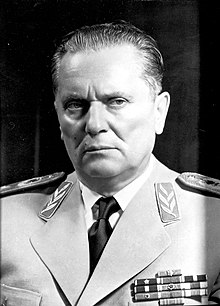Joseph Broz Tito
|
Marshal Josip Broz Tito |
|
|---|---|
 |
|
| 1st President of Yugoslavia | |
|
In office 14 January 1953 – 4 May 1980 |
|
| Prime Minister | Himself (1953–63) Petar Stambolić (1963–67) Mika Špiljak (1967–69) Mitja Ribičič (1969–71) Džemal Bijedić (1971–77) Veselin Đuranović (1977–80) |
| Vice President |
Aleksandar Ranković (1963–66) Koča Popović (1966–67) |
| Preceded by |
Ivan Ribar (as President of the Presidency of the People's Assembly) |
| Succeeded by |
Lazar Koliševski (as President of the Presidency) |
| 23rd Prime Minister of Yugoslavia | |
|
In office 2 November 1944 – 29 June 1963 |
|
| President | Ivan Ribar |
| Preceded by | Ivan Šubašić |
| Succeeded by | Petar Stambolić |
| 1st Secretary-General of the Non-Aligned Movement | |
|
In office 1 September 1961 – 5 October 1964 |
|
| Preceded by | Position created |
| Succeeded by | Gamal Abdel Nasser |
| Minister of Defense of Yugoslavia | |
|
In office 7 March 1945 – 14 January 1953 |
|
| Prime Minister | Himself |
| Preceded by | Ivan Šubašić |
| Succeeded by |
Ivan Gošnjak (as Federal Secretary of National Defense) |
| 4th President of the League of Communists of Yugoslavia | |
|
In office March 1939 – 4 May 1980 |
|
| Preceded by | Milan Gorkić |
| Succeeded by | Branko Mikulić |
| Personal details | |
| Born |
Josip Broz 7 May 1892 Kumrovec, Kingdom of Croatia-Slavonia, Austria-Hungary (modern Croatia) |
| Died | 4 May 1980 (aged 87) Ljubljana, SR Slovenia, SFR Yugoslavia |
| Resting place |
House of Flowers, Belgrade, Serbia 44°47′12″N 20°27′06″E / 44.78667°N 20.45167°E |
| Political party |
Russian Communist Party (Bolsheviks) (RCP(b)) League of Communists of Yugoslavia (SKJ) |
| Spouse(s) | Pelagija Broz (1920–1939), div. Herta Haas (1940–1943) Jovanka Broz (1952–1980) |
| Domestic partner | Davorjanka Paunović |
| Children | Zlatica Broz Hinko Broz Žarko Leon Broz Aleksandar Broz |
| Occupation | Machinist, revolutionary, resistance commander, statesman |
| Awards | 98 international and 21 Yugoslav decorations, including (short list below, full list in the article) |
| Ethnicity | Croat, Slovenian |
| Signature |  |
| Military service | |
| Allegiance |
|
| Service/branch |
Austro-Hungarian Army Yugoslav People's Army |
| Years of service | 1913–1915 1941–1980 |
| Rank | Marshal |
| Commands |
Partisans Yugoslav People's Army (supreme commander) |
| Battles/wars |
First World War Russian Civil War Second World War |
Josip Broz Tito (Cyrillic: Јосип Броз Тито, pronounced [jǒsip brôːz tîto]), born Josip Broz (7 May 1892 – 4 May 1980), was a Yugoslav revolutionary and statesman, serving in various roles from 1943 until his death in 1980. During World War II he was the leader of the Partisans, often regarded as the most effective resistance movement in occupied Europe. While his presidency has been criticized as authoritarian, and concerns about the repression of political opponents have been raised, some historians consider him a benevolent dictator. He was a popular public figure both in Yugoslavia and abroad. Viewed as a unifying symbol, his internal policies maintained the peaceful coexistence of the nations of the Yugoslav federation. He gained further international attention as the chief leader of the Non-Aligned Movement, working with Jawaharlal Nehru of India, Gamal Abdel Nasser of Egypt and Sukarno of Indonesia.
He was General Secretary (later Chairman of the Presidium) of the League of Communists of Yugoslavia (1939–80), and went on to lead the World War II Yugoslav guerrilla movement, the Partisans (1941–45). After the war, he was the Prime Minister (1944–63), President (later President for Life) (1953–80) of the Socialist Federal Republic of Yugoslavia (SFRY). From 1943 to his death in 1980, he held the rank of Marshal of Yugoslavia, serving as the supreme commander of the Yugoslav military, the Yugoslav People's Army (JNA). With a highly favourable reputation abroad in both Cold War blocs, Josip Broz Tito received some 98 foreign decorations, including the Legion of Honour and the Order of the Bath.
...
Wikipedia
